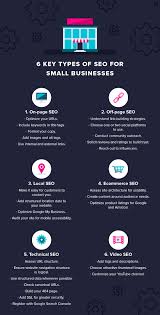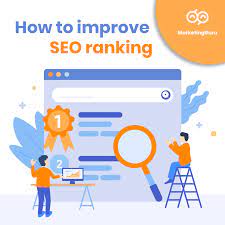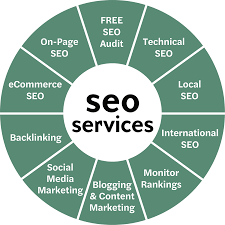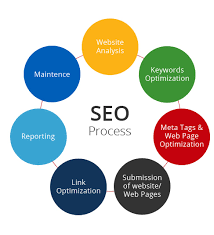The Power of Local Search Engine Optimization
The Power of Local Search Engine Optimization
In today’s digital age, having a strong online presence is crucial for businesses looking to attract local customers. This is where Local Search Engine Optimization (SEO) comes into play. Local SEO focuses on optimising a website to rank better in local search results, making it easier for nearby customers to find your business.
Benefits of Local SEO
Local SEO offers several benefits for businesses targeting local markets. One of the key advantages is increased visibility among local customers searching for products or services in their area. By optimising your website with local keywords and location-specific information, you can improve your chances of appearing in relevant search results.
Another benefit of local SEO is improved credibility and trust among local consumers. When your business appears in local search results and online directories, it signals to potential customers that you are a legitimate and trustworthy option in their area.
Key Strategies for Local SEO
There are several key strategies that businesses can implement to enhance their local SEO efforts:
- Optimise Google My Business: Claiming and optimising your Google My Business listing is essential for local SEO success. Ensure that your business information is accurate and up-to-date.
- Local Keyword Research: Identify relevant keywords that include location-specific terms to target local search queries effectively.
- Local Content Creation: Create content that is tailored to your local audience, including blog posts, landing pages, and customer testimonials with a local focus.
- Online Reviews: Encourage satisfied customers to leave positive reviews on platforms like Google, Yelp, and Facebook to build trust and credibility.
- Citation Building: Ensure consistent NAP (Name, Address, Phone Number) information across online directories and listings to boost your local search rankings.
The Future of Local SEO
As mobile usage continues to rise and voice search becomes more prevalent, the importance of local SEO will only grow. Businesses that invest in optimising their online presence for local searches stand to gain a competitive edge in attracting nearby customers.
In conclusion, Local Search Engine Optimization is a powerful tool for businesses looking to connect with their target audience on a local level. By implementing effective strategies and staying up-to-date with the latest trends in local SEO, businesses can improve their visibility, credibility, and ultimately attract more customers from their community.
21 Frequently Asked Questions About Local Search Engine Optimisation
- What local SEO includes?
- What is local search engine optimization?
- Is local SEO effective?
- Does local do SEO?
- How to do local SEO for beginners?
- What is local SEO example?
- Is it worth paying for local SEO optimization?
- What is local SEO and how does it work?
- What are the types of local SEO?
- How is local SEO different from SEO?
- What is an example of local search engine?
- What is a local search strategy?
- What is local SEO with example?
- How to do local SEO for my website?
- What is a local search engine?
- What is locally optimized SEO?
- How to do local SEO on Google?
- What is local SEO content?
- How to do local SEO in 2022?
- What is the difference between local and global SEO?
- What is local SEO vs traditional SEO?
What local SEO includes?
Local Search Engine Optimization (SEO) encompasses a range of strategies aimed at improving a business’s visibility in local search results. This includes optimising a website with location-specific keywords, creating and managing Google My Business listings, generating positive customer reviews, building citations on online directories, and developing locally-focused content. By focusing on these key elements, businesses can enhance their online presence and attract more local customers searching for products or services in their area.
What is local search engine optimization?
Local search engine optimization (SEO) is a digital marketing strategy focused on improving a business’s visibility in local search results. It involves optimising a website with location-specific keywords and information to attract nearby customers searching for products or services in their area. Local SEO aims to help businesses appear prominently in local search queries, such as “near me” searches, by enhancing their online presence and credibility within the local community. By implementing local SEO techniques, businesses can increase their chances of being discovered by local customers and drive more foot traffic to their physical locations or website.
Is local SEO effective?
Local SEO has proven to be highly effective for businesses targeting local markets. By implementing local SEO strategies such as optimising Google My Business listings, conducting local keyword research, creating location-specific content, and building online reviews and citations, businesses can significantly improve their visibility in local search results. The benefits of local SEO include increased visibility among local customers, enhanced credibility and trust, and the ability to stand out in a competitive market. Overall, businesses that invest in local SEO are likely to see positive results in terms of attracting nearby customers and growing their presence within their community.
Does local do SEO?
The question “Does local do SEO?” often arises among businesses seeking to enhance their online presence within specific geographic areas. Local SEO plays a crucial role in helping businesses target local customers effectively by optimising their online visibility in local search results. By implementing strategies such as local keyword targeting, Google My Business optimisation, and citation building, businesses can improve their chances of appearing in front of potential customers searching for products or services in their vicinity. Therefore, embracing local SEO practices is essential for businesses looking to attract and engage with their target audience on a local level.
How to do local SEO for beginners?
For beginners looking to dive into the world of local SEO, the key is to start with the basics. Begin by claiming and optimising your Google My Business listing, ensuring that all information is accurate and up-to-date. Conduct local keyword research to identify relevant terms that your target audience might use when searching for products or services in your area. Create location-specific content that resonates with local customers, such as blog posts or landing pages tailored to your community. Encourage satisfied customers to leave positive reviews on platforms like Google and Yelp to build credibility. Consistency in NAP (Name, Address, Phone Number) information across online directories is crucial for boosting local search rankings. By focusing on these fundamental strategies, beginners can lay a solid foundation for their local SEO efforts and start attracting more local customers to their business.
What is local SEO example?
Local SEO examples include a local bakery in London optimising its website with keywords like “best bakery in London” to attract customers searching for baked goods in the area. Another example is a plumber in Manchester creating location-specific landing pages targeting keywords such as “emergency plumber in Manchester” to rank higher in local search results. By incorporating local business information, relevant keywords, and location-specific content, businesses can effectively leverage local SEO to connect with their target audience and drive more foot traffic or online enquiries from nearby customers.
Is it worth paying for local SEO optimization?
When considering whether it is worth paying for local SEO optimization, businesses should weigh the potential benefits against the investment. Local SEO can significantly enhance a business’s online visibility among local customers, leading to increased website traffic, higher conversion rates, and improved brand credibility within the community. By investing in professional local SEO services, businesses can gain a competitive edge in attracting nearby customers and establishing a strong digital presence in their target market. Ultimately, the return on investment from effective local SEO strategies can outweigh the initial costs, making it a valuable investment for businesses looking to thrive in their local area.
What is local SEO and how does it work?
Local SEO refers to the process of optimising a website to improve its visibility in local search results. It involves various strategies such as using location-specific keywords, creating content tailored to local audiences, and ensuring consistency in business information across online directories. Local SEO works by helping search engines like Google understand the relevance of a business to a particular location. By implementing local SEO techniques effectively, businesses can increase their chances of appearing in search results when users look for products or services in their area. This not only enhances visibility but also helps businesses attract more local customers and build credibility within their community.
What are the types of local SEO?
When it comes to local Search Engine Optimization (SEO), there are several types of strategies that businesses can implement to improve their visibility in local search results. Some common types of local SEO include on-page optimization, where businesses optimise their website content with relevant local keywords and location information. Another type is off-page optimization, which involves building local citations and backlinks from reputable local websites to boost a business’s authority in the local area. Additionally, businesses can focus on Google My Business optimization, ensuring that their listing is complete and accurate to enhance their presence in Google’s local search results. By combining these different types of local SEO strategies, businesses can effectively target and attract nearby customers searching for products or services in their area.
How is local SEO different from SEO?
Local SEO differs from traditional SEO in its focus on targeting a specific geographic area. While SEO aims to improve a website’s visibility on a global scale, local SEO concentrates on optimising a website to rank better in local search results. This means incorporating location-specific keywords, creating local content, and optimising Google My Business listings to enhance visibility among potential customers in the nearby vicinity. By tailoring strategies to target local audiences, businesses can effectively connect with their community and attract relevant traffic that is more likely to convert into customers.
What is an example of local search engine?
An example of a local search engine is Google Maps. Google Maps not only provides users with maps and directions but also offers local search functionality, allowing users to discover nearby businesses, services, and points of interest based on their location. Through Google Maps’ local search feature, users can easily find restaurants, shops, hotels, and other businesses in their vicinity, making it a valuable tool for both consumers and businesses looking to enhance their local visibility and attract nearby customers.
What is a local search strategy?
A local search strategy refers to the specific plan of action implemented by businesses to enhance their visibility in local search results. This strategy typically involves optimising online presence with location-specific keywords, ensuring accurate business information on platforms like Google My Business, and actively managing online reviews to build credibility among local consumers. By focusing on a local search strategy, businesses aim to attract nearby customers searching for products or services in their area, ultimately driving foot traffic and increasing sales within their community.
What is local SEO with example?
Local SEO, or Local Search Engine Optimization, is a digital marketing strategy that focuses on improving a business’s visibility in local search results. This involves optimising a website with location-specific keywords, creating local content, and managing online reviews to attract nearby customers. An example of local SEO in action would be a small cafe in London implementing local SEO strategies to appear at the top of search results when someone searches for “best coffee shops near me” in the area. By optimising their website with relevant keywords like “London cafe” and encouraging positive reviews from satisfied customers, the cafe can effectively target local consumers and drive foot traffic to their establishment.
How to do local SEO for my website?
To effectively implement local SEO for your website, start by claiming and optimising your Google My Business listing with accurate business information and location details. Conduct local keyword research to identify relevant terms that include location-specific keywords. Create locally-focused content such as blog posts and landing pages targeting your local audience. Encourage satisfied customers to leave positive reviews on platforms like Google and Yelp to boost credibility. Ensure consistent NAP (Name, Address, Phone Number) information across online directories for better local search rankings. By following these key strategies, you can enhance your website’s visibility in local search results and attract more nearby customers to your business.
What is a local search engine?
A local search engine is a specialised online platform that enables users to search for businesses, products, or services within a specific geographic area. Unlike traditional search engines that provide global results, local search engines focus on delivering relevant information based on the user’s location. These platforms use location-based data to display nearby businesses, reviews, contact details, and directions, making it easier for users to find local businesses that meet their needs. By utilising a local search engine, individuals can discover businesses in their vicinity and make informed decisions about where to shop, dine, or access services within their community.
What is locally optimized SEO?
Locally optimized SEO refers to the practice of tailoring search engine optimization strategies to target a specific geographic location or region. It involves optimising a website’s content, keywords, and online presence to rank higher in local search results, making it easier for users in that area to find relevant businesses or services. By incorporating location-specific information and targeting local keywords, businesses can enhance their visibility among local customers and improve their chances of attracting nearby leads. Locally optimized SEO plays a vital role in helping businesses connect with their target audience on a more personalised and targeted level within their local community.
How to do local SEO on Google?
When it comes to implementing local SEO on Google, there are several key steps to follow for optimal results. Firstly, claim and optimise your Google My Business listing with accurate business information, including your address, phone number, and business hours. Utilise relevant keywords that incorporate location-specific terms to improve your visibility in local search results. Encourage customers to leave positive reviews on Google to enhance your credibility and trustworthiness. Consistent NAP (Name, Address, Phone Number) information across online directories is crucial for boosting your local search rankings. By focusing on these essential strategies, businesses can effectively leverage Google for successful local SEO campaigns.
What is local SEO content?
Local SEO content refers to website content that is specifically crafted to target local audiences and improve a business’s visibility in local search results. This type of content typically includes location-specific keywords, such as city names or neighbourhoods, to help search engines understand the geographic relevance of the information. Local SEO content can take various forms, including landing pages, blog posts, service pages, and business listings. By creating high-quality and relevant local SEO content, businesses can attract more local customers, enhance their online presence within their community, and ultimately drive more traffic to their website.
How to do local SEO in 2022?
In 2022, implementing an effective local SEO strategy involves a combination of traditional best practices and adapting to the latest trends in digital marketing. To do local SEO successfully this year, businesses should focus on optimising their Google My Business profile with accurate information, engaging visuals, and regular updates. Conducting thorough local keyword research to target location-specific terms and creating high-quality, locally-focused content are essential steps to improve visibility in local search results. Emphasising the importance of online reviews, citation building, and mobile responsiveness will also play a significant role in enhancing local SEO efforts in 2022. By staying informed about the evolving landscape of search engine algorithms and user behaviour trends, businesses can position themselves for success in capturing the attention of local customers this year.
What is the difference between local and global SEO?
When it comes to Search Engine Optimization (SEO), the difference between local and global SEO lies in the target audience and reach. Local SEO focuses on optimising a website to rank better in local search results, targeting customers within a specific geographic area. This includes using location-specific keywords, creating localised content, and optimising Google My Business listings. On the other hand, global SEO aims to reach a broader audience across multiple regions or countries. It involves targeting keywords with a wider scope, creating content that appeals to a global audience, and implementing international SEO strategies to improve visibility on a larger scale. Both local and global SEO are essential for businesses looking to enhance their online presence and attract relevant traffic based on their target market’s scope.
What is local SEO vs traditional SEO?
Local SEO and traditional SEO serve different purposes in the realm of digital marketing. Local SEO focuses on optimising a business’s online presence to attract local customers searching for products or services in their area. It involves strategies such as targeting location-specific keywords, optimising Google My Business listings, and building citations in local directories. On the other hand, traditional SEO aims to improve a website’s visibility on a broader scale, targeting a larger audience regardless of their location. While traditional SEO focuses on ranking high in organic search results globally or nationally, local SEO is geared towards enhancing visibility within specific geographic regions. Both types of SEO are essential for businesses, but local SEO specifically caters to attracting nearby customers and driving foot traffic to physical locations.









